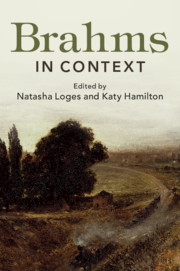Book contents
- Brahms in Context
- Brahms in Context
- Copyright page
- Dedication
- Contents
- Illustrations
- Music Examples
- Notes on Contributors
- Preface
- Abbreviations
- Part I Personality, People and Places
- Part II Identities, Environments and Influences
- Part III Performance and Publishing
- Part IV Society and Culture
- Chapter 26 Politics and Religion
- Chapter 27 Literature
- Chapter 28 Philosophy
- Chapter 29 Visual Arts
- Chapter 30 Science and Technology
- Part V Reception and Legacy
- Further Reading
- Index
- References
Chapter 27 - Literature
from Part IV - Society and Culture
Published online by Cambridge University Press: 15 May 2019
- Brahms in Context
- Brahms in Context
- Copyright page
- Dedication
- Contents
- Illustrations
- Music Examples
- Notes on Contributors
- Preface
- Abbreviations
- Part I Personality, People and Places
- Part II Identities, Environments and Influences
- Part III Performance and Publishing
- Part IV Society and Culture
- Chapter 26 Politics and Religion
- Chapter 27 Literature
- Chapter 28 Philosophy
- Chapter 29 Visual Arts
- Chapter 30 Science and Technology
- Part V Reception and Legacy
- Further Reading
- Index
- References
Summary
Brahms was among the many avid consumers of the print culture which burgeoned unprecedentedly during his century. The mid-eighteenth century onwards saw a surge in German-language publishing, following the gradual supplanting of Latin as a scholarly language and Johann Gottfried von Herder’s advocacy of popular literature as the highest expression of the national spirit. During the long nineteenth century, a vast amount of printed matter was devoured by an eager public. Apart from journalism, there were huge numbers of magazines that serialised popular fiction, science, geography, history and suchlike, as well as handsome bound collected editions of classical authors such as Goethe, Schiller and Shakespeare in translation, aimed at aspirational middle-class households. Literature was crucial to the wider nation-building agenda to unite the various disparate German-speaking territories and principalities under the umbrella of language. It was inseparable from shifts in religion, philosophy and science, and was shaped and re-shaped by successive waves of political censorship.
- Type
- Chapter
- Information
- Brahms in Context , pp. 269 - 276Publisher: Cambridge University PressPrint publication year: 2019

